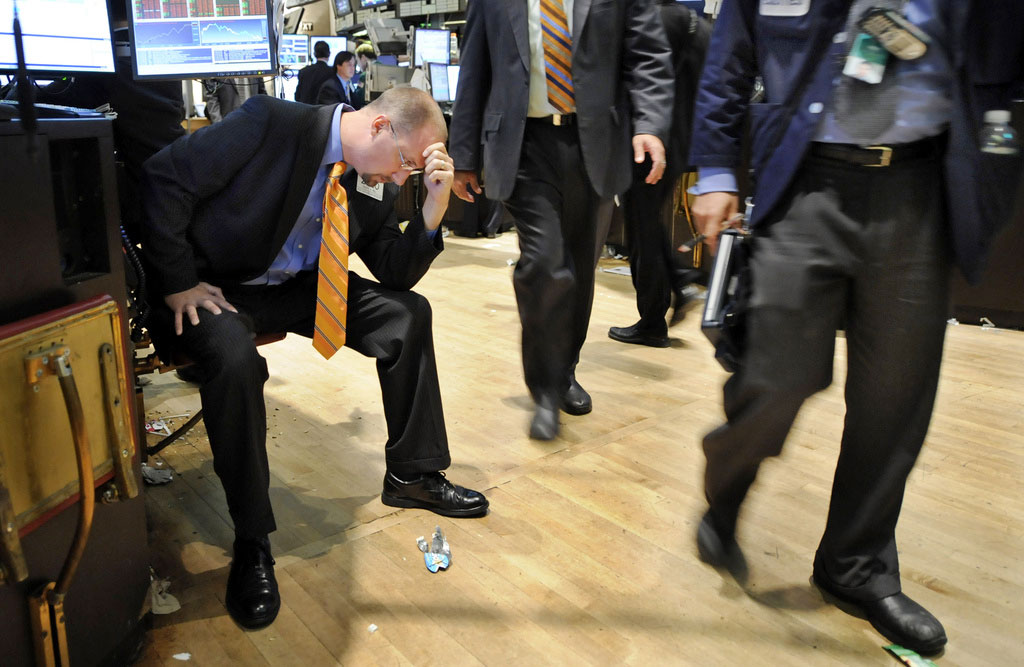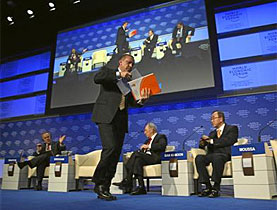Public Eye keeps close watch on Davos

Swiss non-governmental organisations are heading to the World Economic Forum where they will name and shame “the nastiest corporate players of the year”.
On Wednesday, Berne Declaration and Greenpeace Switzerland will present the Public Eye Awards on the WEF sidelines.
The event organisers will hand out awards in “Global”, “Swiss” and People’s categories, and for the first time a “Greenwash” prize will be given to a firm that uses a “social-environmental fig leaf” to make it look greener than it is.
The nominees this year represent a diverse range of industries, and include steel manufacturer Arcelor Mittal, Swiss pharmaceutical company Roche and the Royal Bank of Canada.
The event will not take place in the revered confines of the Congress Centre but in a rather modest hall in a hotel that has seen better days.
As Andreas Missbach, head of the Berne Declaration’s private finance programme, told swissinfo.ch, Davos is a “siege city” during the annual WEF meeting and it’s not easy to find a place to stage the show.
But Missbach expects a packed house for the award ceremony, with – or most likely without – some of the (in)famous winners.
swissinfo.ch: The first Public Eye event took place in 2000, shortly after the demonstrations against the World Trade Organization in Seattle. What was the idea behind launching the event?
Andreas Missbach: Obviously the WEF at that time was completely unchallenged by anyone and it had started during the 90s to present itself even more as the institution for solving the world’s problems.
Of course NGOs have their ideas about who should solve the world’s problems… a business-led process that claims to solve all the world’s problems was definitely not what we wanted to see.
Our initial idea actually was to present at Davos a sort of counter-summit to the WEF with more or less the same format, which is panels with talking heads but with the issues that we as the civil society thought were the most pressing and with those people and voices that are usually not heard at the WEF, which means poor people, farmers, women and so on.
swissinfo.ch: Does your organisation, the Public Eye, really serve any useful purpose?
A.M.: The Public Eye awards are a kind of spotlight on the behavior of certain corporations. It’s not just a media or PR action but we make sure that the cases we present there are backed up by real campaigns… We hope by disturbing the mood a little bit in Davos, which used to be very self-righteous… we can at least have a more balanced discussion and view on what happens.
swissinfo.ch: What do you want exactly?
A.M.: : Apart from helping our partner organisations with their campaigns to give them more profile, we don’t want to let the WEF and Mr [Klaus] Schwab (founder and chairman) and WEF members present themselves as the force for good without being challenged by anyone.
swissinfo.ch: What kinds of successes do you think you’ve had?
A.M.: As an example, in 2008 we gave the Public Eye Swiss award to the mining company Glencore for labour problems and conflicts with communities concerning a coal mine in Colombia. As usual we invited the CEO to pick up the award. Of course, he didn’t come and then we actually had the idea to go with a rap artist to take the award to the company. This happened three times. The first two occasions they refused and so we came back with more people and more media. They then not only accepted the award but also three concrete demands raised by our partners in Colombia in terms of the relationship between the company and the union.
swissinfo.ch: What about failures?
A.M.: You can say that when we don’t see any real change in a company’s behaviour or a move to more responsible business practices, we and our partners have failed…it’s obvious that we have to fail most of the time, otherwise we wouldn’t be needed any more.
swissinfo.ch: How would you react if some people accused you of being a group of leftwing alternatives which has no idea of the real world?
A.M.: Some people actually tend to confuse the human rights that every human being on this planet has by birth with a leftwing radical position. If that is the case, I’m actually comfortable with being a radical… As far as the real world is concerned, I would definitely challenge that because I think most of those corporate leaders don’t have an idea of the real world. They’ve never been to a community that lives close to a mine that is polluting their water and their air. They’ve never been together with small farmers that have been expelled because of the expansion of large-scale agriculture. Those people live in their closed atmosphere of Davos, of luxury hotels, of bonuses, of private airplanes. I really don’t think they have an idea of what most of the planet looks like and what the reality of poor people is.
swissinfo.ch: Do you ever get to meet people from the WEF management?
A.M.: Yes, we have a kind of working relationship; we’re part of the scene up there. We have a meeting at least once a year with André Schneider, the WEF managing director. I think they see us as part of the game and on that level it’s a professional relationship. Of course, we disagree on almost all the substantive and political questions.
swissinfo. ch: How do people in Davos itself look at you?
A.M.: I think we’ve gained some reputation with the local population. It was difficult at the beginning when there were big protests, even in Davos, and it was sometimes difficult to explain that we were critical – we criticised the legitimacy of the WEF, but we were not aligned to the ones that were smashing windows. Compared with the WEF, we are completely open and transparent. Anyone can come in and see what we are doing there and make up their own minds about our events in Davos.
Robert Brookes in Zurich, swissinfo.ch
The ceremony will take place on the opening day of the WEF’s annual meeting – January 27 – and will be moderated by German film actress Julia Jentsch.
She will be joined by keynote speakers Joseph E. Stiglitz, Nobel Laurate in Economics, and Jürgen Tritten, former German Environment Minister and current parliamentary leader of the Greens.
There are a number of awards in the categories Global, Swiss and People’s. A new one in 2010 is called the Greenwash Award.

In compliance with the JTI standards
More: SWI swissinfo.ch certified by the Journalism Trust Initiative












You can find an overview of ongoing debates with our journalists here . Please join us!
If you want to start a conversation about a topic raised in this article or want to report factual errors, email us at english@swissinfo.ch.